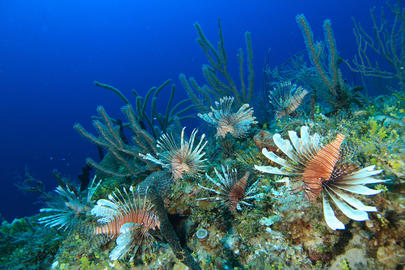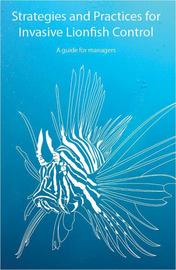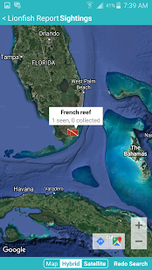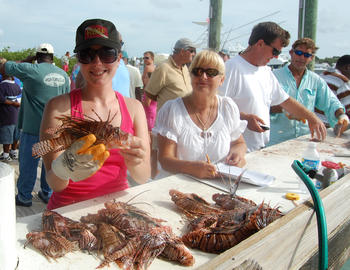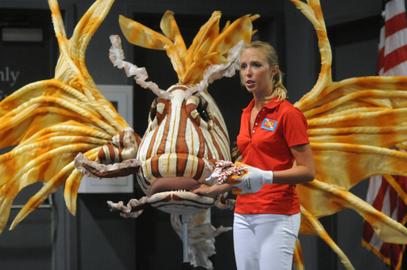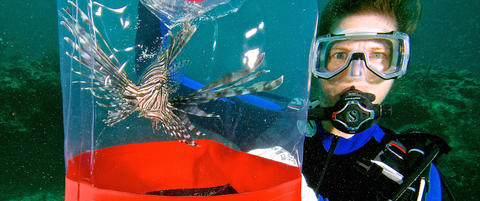REEF is continuing our ground-breaking research and outreach on the lionfish invasion with projects in Puerto Rico and the US Virgin Islands. The project is supported with funding from the NOAA Coral Reef Conservation Grant and the Buck Island REEF National Park and long-time supporters Henry Foundation, Oceans Foundation and Munson Foundation.
REEF, in collaboration with the University of Virgin Islands and Buck Island National Monument, took a major step last week in a novel study to better understand lionfish movement and factors that may influence that movement. The study, focusing on a 2km area of patch and continuous reef in St Croix, used innovative underwater tagging techniques pioneered by REEF to surgically implant transmitters into invasive lionfish within an array of receivers, allowing the team to pinpoint movement of the fish over the next year.
REEF is excited to announce the release of Invasive Lionfish: A Guide to Control and Management. Available as an e-book to view and/or download (formatted for desktop and mobile devices), this extensive manual was created to aid coastal managers and field workers in effectively managing the invasive lionfish problem.
This paper examined the genetic source of the invasive Indo-Pacific lionfish in the Bahamas. Many of the samples used in this study were collected during REEF's lionfish research trips during 2007 and 2008. Two species, Pterois volitans and P. miles, were well established along the United States east coast before the first lionfish were reported from the Bahamas in 2004, where they quickly dispersed throughout the archipelago by 2007.
REEF is exctied to announce the launch of our new Lionfish Sightings App – a free app designed specifically to connect divers to remove lionfish from the Tropical Western Atlantic. Report lionfish you have collected or simply report lionfish sightings so other divers know where to look! Follow this link to download the app for iOS or follow this link to download the app for Android.
We are excited to share the latest publication stemming from REEF's Invasive Lionfish Research Program - "Mobilizing volunteers to sustain local suppression of a global marine invasion," recently published in the scientific journal Conservation Letters.
$1,184 -- Package Includes: 7 nights in Junior Suite room at the Comfort Suites Turks & Caicos, resort taxes, fees and gratuities, daily continental breakfast, and 6 days of 2-tank boat dives with Dive Provo. Please inquire for single occupancy and non-diver rates.
Please contact Doris Pfister at Caradonna to find out more and to book your space on this trip -- 1-877-295-7333 (REEF), REEF@caradonna.com
As part of our efforts to address the lionfish invasion to the western Atlantic, REEF received a grant from the US Fish and Wildlife Service Aquatic Invasive Species Program to organize and lead lionfish workshops throughout the Southeast United States. Between August and October, REEF staff Keri Kenning and Lad Akins will be traveling to more than a dozen coastal communities to present information on the lionfish invasion and hands-on demonstrations on collecting and handling.
A new scientific paper with results from REEF's Invasive Species Program research was recently published in the journal Conservation Science and Practice. The findings shed light on the factors affecting invasive lionfish intervention success and efficiency and how to best incorporate these findings into local management for invasive species. As part of a multi-year study with funding from NOAA Coral Reef Conservation Program and others, REEF and partners coordinated regional efforts by divers to cull invasive lionfish on 33 U.S.
Designing effective local management for invasive species poses a major challenge for conservation, yet factors affecting intervention success and efficiency are rarely evaluated and incorporated into practice. As part of a multi-year study with funding from NOAA Coral Reef Conservation Program and others, REEF and partners coordinated regional efforts by divers to cull invasive lionfish (Pterois spp.) on 33 U.S. Atlantic, Gulf of Mexico, and Caribbean protected coral reefs from 2013 to 2019.

